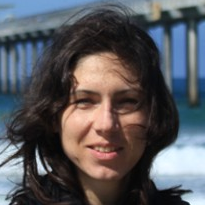
For most cells, a sudden decrease in external osmolarity results in fast water influx, which can burst the cell. To survive, cells rely on the passive response of mechanosensitive channels, which open under increased membrane tension and allow the release of cytoplasmic solutes and water. Although the gating and the molecular structure of mechanosensitive channels found in Escherichia coli have been extensively studied, the overall dynamics of the whole cellular response remain poorly understood.
I will present single-cell characterization of E. coli‘s passive response to a sudden hyposmotic shock (downshock) and show that initial fast volume expansion is followed by a slow volume recovery that can end below the initial value. I will also show similar response patterns observed at downshocks of a wide range of magnitudes. Apart from the response of the wild type E.coli cells, I will also characterise the response of a double mutant strain that lacks two major mechanosensitive channels, Delta MscL and Delta MscS. While the wild type adapted to osmotic downshocks and resumed growing, cells of a double mutant expanded, but failed to fully recover, often lysing or not resuming growth at high osmotic downshocks.
Finally, I will present a theoretical model to explain the observations by simulating mechanosensitive channels opening, solute efflux, and water flux. The model illustrates how solute efflux, driven by mechanical pressure and solute chemical potential, competes with water influx to reduce cellular osmotic pressure and allow volume recovery. It includes the stress stiffening characteristics of the cell wall and makes several predictions, which I will discuss. The work highlights the vital role of mechanosensation in bacterial survival.
Teuta Pilizota studied undergraduate level physics at University of Zagreb, Department of Physics (Croatia) and obtained her PhD in biophysics from University of Oxford, Department of Physics (UK). During her PhD (in collaboration with Dr. Richard Berry and Prof. Judy Armitage) she developed and used an optical trap optimized for single molecule studies of two rotary molecular motors, bacterial flagellar motor and F1Fo-ATPase. For her post-doctoral training she moved to Princeton University (USA), where her research focus moved to single cell studies of bacterial osmoregulatory network (in collaboration with Prof. Joshua Shaevitz). Teuta joined University of Edinburgh (UK) as a Chancellor’s Fellow (Assistant Professor) in January 2013. Her group’s research focuses on understanding bacterial growth, including osmotically induced growth rate modulations and interaction between osmoregulatory and other bacterial stress response networks. More recently, the group is focusing on dynamics of free energy flows in bacterial cell, in particular free energy maintenance strategies during exposure to various forms of stresses.